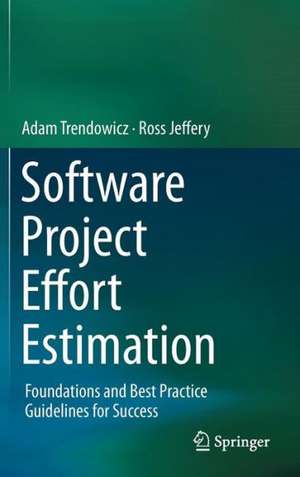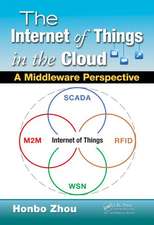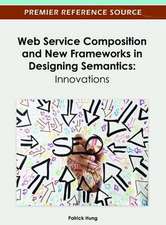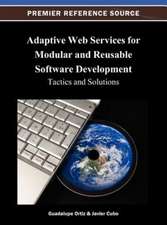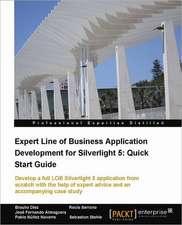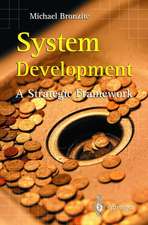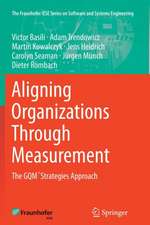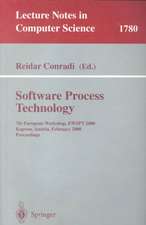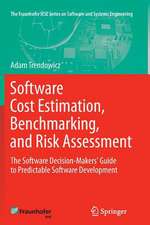Software Project Effort Estimation: Foundations and Best Practice Guidelines for Success
Autor Adam Trendowicz, Ross Jefferyen Limba Engleză Hardback – 16 mai 2014
Trendowicz and Jeffery present a comprehensive look at the principles of software effort estimation and support software practitioners in systematically selecting and applying the most suitable effort estimation approach. Their book not only presents what approach to take and how to apply and improve it, but also explains why certain approaches should be used in specific project situations. Moreover, it explains popular estimation methods, summarizes estimation best-practices, and provides guidelines for continuously improving estimation capability. Additionally, the book offers invaluable insights into project management in general, discussing issues including project trade-offs, risk assessment, and organizational learning.
Overall, the authors deliver an essential reference work for software practitioners responsible for software effort estimation and planning in their daily work and who want to improve their estimation skills. At the same time, for lecturers and students the book can serve as the basis of a course in software processes, software estimation, or project management.
| Toate formatele și edițiile | Preț | Express |
|---|---|---|
| Paperback (1) | 342.13 lei 6-8 săpt. | |
| Springer International Publishing – 3 sep 2016 | 342.13 lei 6-8 săpt. | |
| Hardback (1) | 348.57 lei 6-8 săpt. | |
| Springer International Publishing – 16 mai 2014 | 348.57 lei 6-8 săpt. |
Preț: 348.57 lei
Preț vechi: 435.71 lei
-20% Nou
Puncte Express: 523
Preț estimativ în valută:
66.70€ • 69.83$ • 55.19£
66.70€ • 69.83$ • 55.19£
Carte tipărită la comandă
Livrare economică 05-19 aprilie
Preluare comenzi: 021 569.72.76
Specificații
ISBN-13: 9783319036281
ISBN-10: 3319036289
Pagini: 492
Ilustrații: XXII, 469 p. 86 illus.
Dimensiuni: 155 x 235 x 32 mm
Greutate: 0.86 kg
Ediția:2014
Editura: Springer International Publishing
Colecția Springer
Locul publicării:Cham, Switzerland
ISBN-10: 3319036289
Pagini: 492
Ilustrații: XXII, 469 p. 86 illus.
Dimensiuni: 155 x 235 x 32 mm
Greutate: 0.86 kg
Ediția:2014
Editura: Springer International Publishing
Colecția Springer
Locul publicării:Cham, Switzerland
Public țintă
Professional/practitionerCuprins
PART I Foundations.- Challenges of Predictable Software Development.- Principles of Effort and Cost Estimation.- Common Factors Influencing Software Project Effort.- Estimation under Uncertainty.- Basic Estimation Strategies.- PART II Selecting An Appropriate Estimation Method.- Classification of Effort Estimation Methods.- Finding the Most Suitable Estimation Method.- PART III Popular Effort Estimation Methods.- Statistical Regression Analysis.- Constructive Cost Model – COCOMO.- Classification and Regression Trees.- Case-Based Reasoning.- Wideband Delphi.- Planning Poker.- Bayesian Belief Networks – BBN.- CoBRA.- PART IV Establishing Sustainable Effort Estimation.- Continuously Improving Effort Estimation.- Effort Estimation Best Practices.- Appendix.
Recenzii
"It is the most complete work on all aspects of software effort estimation that I have seen. It provides an excellent reference for the field and belongs on the bookshelf of every organization that needs to manage a software project." from the foreword by Victor Basili, University of Maryland, USA
"This dense book would serve as a reference in a software library, and would be a great resource for software engineering students, as well as managers, engineers, and architects." Naga Narayanaswamy, ACM Computing Reviews, December 2014
"This dense book would serve as a reference in a software library, and would be a great resource for software engineering students, as well as managers, engineers, and architects." Naga Narayanaswamy, ACM Computing Reviews, December 2014
Notă biografică
Adam Trendowicz is a senior consultant at the Fraunhofer Institute for Experimental Software Engineering (IESE) in Kaiserslautern, Germany, where he leads the Measurement and Prediction team. He has led software cost estimation and software measurement improvement activities in software companies of different sizes and from various fields, and has been involved in functional software size estimation and productivity benchmarking in organizations from both industry and the public sector. Trendowicz’s other software engineering interests include project management, software product quality modeling and evaluation, and technology validation by means of empirical methods.
Ross Jeffery is an Emeritus Professor of Software Engineering at the UNSW’s School of Computer Science and Engineering and a research consultant in the Systems Software Research Group at National ICT Australia (NICTA). His research interests are in software process and product modeling and improvement, software knowledge management, software metrics, software technical and management reviews, and software resource modeling and estimation. His research has involved over fifty government and industry organizations over a period of more than 20 years and has been funded by the industry, government and universities. Jeffery was elected a Fellow of the Australian Computer Society for his contributions to software engineering research.
Ross Jeffery is an Emeritus Professor of Software Engineering at the UNSW’s School of Computer Science and Engineering and a research consultant in the Systems Software Research Group at National ICT Australia (NICTA). His research interests are in software process and product modeling and improvement, software knowledge management, software metrics, software technical and management reviews, and software resource modeling and estimation. His research has involved over fifty government and industry organizations over a period of more than 20 years and has been funded by the industry, government and universities. Jeffery was elected a Fellow of the Australian Computer Society for his contributions to software engineering research.
Textul de pe ultima copertă
Software effort estimation is one of the oldest and most important problems in software project management, and thus today there are a large number of models, each with its own unique strengths and weaknesses in general, and even more importantly, in relation to the environment and context in which it is to be applied.
Trendowicz and Jeffery present a comprehensive look at the principles of software effort estimation and support software practitioners in systematically selecting and applying the most suitable effort estimation approach. Their book not only presents what approach to take and how to apply and improve it, but also explains why certain approaches should be used in specific project situations. Moreover, it explains popular estimation methods, summarizes estimation best-practices, and provides guidelines for continuously improving estimation capability. Additionally, the book offers invaluable insights into project management in general, discussing issues including project trade-offs, risk assessment, and organizational learning.
Overall, the authors deliver an essential reference work for software practitioners responsible for software effort estimation and planning in their daily work and who want to improve their estimation skills. At the same time, for lecturers and students the book can serve as the basis of a course in software processes, software estimation, or project management.
Trendowicz and Jeffery present a comprehensive look at the principles of software effort estimation and support software practitioners in systematically selecting and applying the most suitable effort estimation approach. Their book not only presents what approach to take and how to apply and improve it, but also explains why certain approaches should be used in specific project situations. Moreover, it explains popular estimation methods, summarizes estimation best-practices, and provides guidelines for continuously improving estimation capability. Additionally, the book offers invaluable insights into project management in general, discussing issues including project trade-offs, risk assessment, and organizational learning.
Overall, the authors deliver an essential reference work for software practitioners responsible for software effort estimation and planning in their daily work and who want to improve their estimation skills. At the same time, for lecturers and students the book can serve as the basis of a course in software processes, software estimation, or project management.
Caracteristici
Most comprehensive reference work on all aspects of software estimation Authors have more than 20 years experience in academia, the industry and public sector Explains the what, how and why of all major software estimation methods Also offers invaluable insights into general project management, risk management and organizational learning Includes supplementary material: sn.pub/extras
